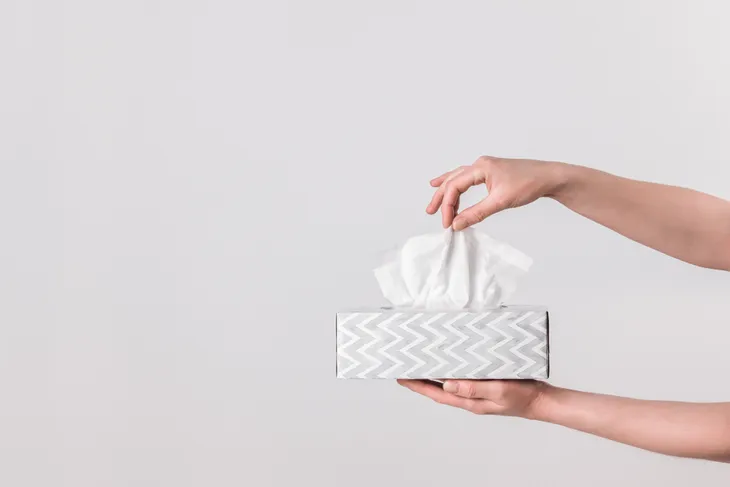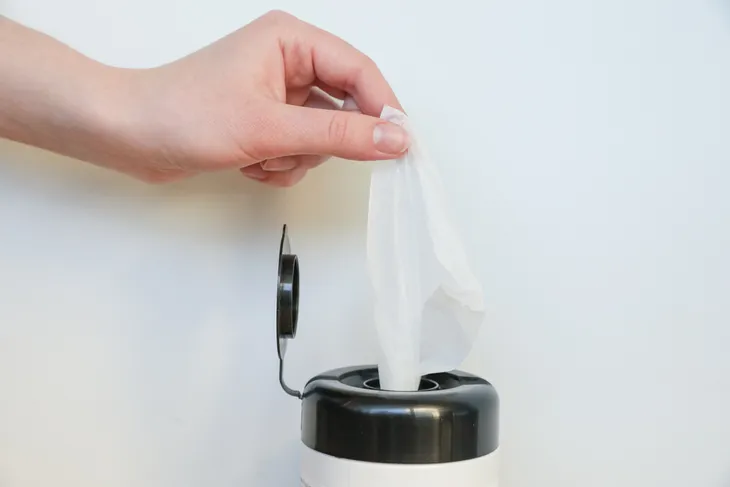- There’s nothing worse than having to run to the store for supplies while you’re sick.
- Creating a flu emergency kit will help you be prepared if sickness plagues your home.
- Practicing good hygiene habits and getting an annual flu shot can also help prevent sickness.
There’s a lot to look forward to during the fall and winter months but one thing most of us dread is flu season. Seasonal influenza doesn’t only impact the U.S. but worldwide too. In fact, the flu causes an estimated 1 billion infections worldwide every year.
The best way to get through the flu season is to create a flu emergency kit to ensure you’re prepared if sickness hits your home. Here’s a list of items you’ll need to get through the flu season, plus a few tips to help prevent catching the flu.
Hand Sanitizer
One way you can prevent spreading germs is by using hand sanitizer but there are a few important things to remember. First, hand sanitizer should not replace good ole handwashing. The Centers for Disease Control and Prevention (CDC) says washing hands with soap and water (for at least 20-seconds) is the best way to remove germs. But when you don’t have access to soap and water, hand sanitizer is your next best option.
Not all hand sanitizers are created equal either. The source says you should only buy and use hand sanitizers with at least 60-percent alcohol if you want to avoid getting sick and prevent spreading germs to others. How you apply the sanitizer is important too. Some people don’t use enough product or wipe it off before it has dried. The best way to apply hand sanitizer is to first read the label to learn the correct amount, and then rub the product over the surfaces of your hands until it’s dry.
Facial Tissues
Another must-have item in your flu emergency kit is facial tissues. Stock up on boxes of tissues as well as travel packs that you can put in your car, purse, and jacket.
Not only are tissues necessary to help remove mucus from your nose, but relying on tissues also helps you prevent spreading germs to others when you’re sick. Just be sure to throw used tissues in the garbage as soon as possible.
Thermometer
If you don’t already have a thermometer on hand, consider investing in one before the flu season starts. Fevers are a common symptom of the flu virus and a thermometer can help confirm the fever. There are tons of thermometers to choose from too. You may opt for a traditional thermometer or a digital one. Non-contact infrared thermometers are also an option.
Along with having a thermometer on hand, it’s important to know what qualifies as a fever. According to the Merck Manual, a fever is defined as:
- An oral temperature (greater or equal to) of 37.2-degrees Celsius in the early morning.
- An oral temperature (greater or equal to) 37.8-degrees Celsius any time after the early morning.
- A temperature higher than a person’s known normal daily value.
Stock Your Medicine Cabinet
There’s nothing worse than falling ill and not having medicine on hand. Going out in public when you’re sick is not only dreadful, but you can put other people’s health at risk too. This is why it’s best to stock your medicine cabinet before flu season begins.
First, take an inventory of what you have and throw out any expired medicine. Then make a list of what you need. Over-the-counter (OTC) cold and flu medicines, such as decongestants, fever relievers, and pain relievers are all great medicines to stock up on. If you have children, be sure to stock up on children’s medicine too.
Cough Drops
Sore throat and a dry cough are common symptoms of the flu. With this in mind, consider stocking up on cough drops and OTC lozenges for the flu season. Healthline says some OTC lozenges contain menthol, which can gently numb the tissue in your throat. In turn, this can provide temporary relief from a sore through.
Cough drops are also effective because they increase saliva production to help lubricate your throat. The source also reminds us that cough drops and OTC lozenges should not be given to young children as they can be a choking hazard.
Disinfectant Wipes or Spray
Close contact with a sick person is the most common way to catch the flu virus but the virus can also live on surfaces. In fact, the Mayo Clinic explains the flu virus can stay infectious on surfaces for several hours to even days. Generally, the virus stays active longer on hard surfaces than on the fabric of soft surfaces.
With this in mind, stocking up on disinfectant wipes and spray for the flu season is key. Be sure to wipe down high-traffic areas and items, such as light switches, door knobs, and toys. Pack disinfectant wipes in your bag in case you need to wipe down surfaces when you’re on the go, such as shopping carts.
Fluids for Hydration
Fluid loss is possible with the flu, especially if you have a decreased appetite or symptoms like vomiting and diarrhea. This is why it’s important to stock up on fluids for the flu season. The CDC says to provide plenty of fluids at the first sign of the flu.
The source says to avoid alcohol and caffeinated beverages. Also, avoid sugary drinks like artificial fruit juice. The best beverages to sip on while you’re sick are plain water, broth, or sports drinks with electrolytes. A doctor may recommend Pedialyte for children. The source also says older adults who have kidney problems should check in with their doctor about safe amounts of liquid to drink when sick.
Warm Liquids
Drinking warm liquids may not help you get over the flu faster, but they can be comforting. WebMD also notes that they may help relieve symptoms like nasal congestion and prevent dehydration. Healthline says warm liquids may help ease a sore throat and cough because the fluids can help keep the throat moist and prevent further irritation.
When shopping for warm liquids, stock up on soup but stay away from acidic varieties, such as tomato soup. Chicken soup is a better option. Bone broth, caffeinated-free teas, or warm water with honey are also great options.
Cool-Mist Humidifier
If you don’t already have a cool-mist humidifier in your home, buying one before the flu season starts is a great idea. Humidifiers can help combat dry winter air but they may provide additional benefits when you’re sick.
Verywell Health says that cool-mist humidifiers may help moisten your nasal passages and relieve congestion. The source explains, “Using a humidifier makes it easier for you to breathe and makes it easier for the mucus to drain.”
It’s also important to keep the humidifier clean and well-maintained. Humidifiers can be a breeding ground for mold and bacteria, which can get sent out into the air when they’re running. So be sure to inspect and clean it regularly.
Extra Masks
Masks are another great item that can help keep you and others protected during flu season. When going out in public (especially during the flu season) you may want to wear a mask to help avoid getting sick. If you’re sick, it’s best to stay home but if you absolutely have to go out, be sure to wear a mask to avoid getting others sick.
Consider stocking up on disposable or reusable cloth masks. Disposable masks should be thrown out after every use. Reusable cloth masks can be worn multiple times on the same day but should be stored in a breathable bag to keep them dry and clean between uses. The CDC says always wash a cloth mask at least once a day. Finally, it’s also important to wash or sanitize your hands after removing any mask.
Get a Flu Shot
According to the CDC, a flu vaccine is “the first and best way to reduce your chances of getting the flu and spreading it to others.” So, if you haven’t had your flu shot yet, you may want to consider booking an appointment.
The source recommends that everyone over the age of 6-months gets vaccinated for the flu once a year. To be prepared, book your vaccine ahead of the flu season but it’s still worth getting if you haven’t received it after flu season starts.
How to Prevent the Flu
Brushing up on tips to prevent the flu is another great way to help you get through the flu season. Practicing good hygiene habits like washing your hands often (or using hand sanitizer when necessary) is an important step in preventing the flu.
The CDC says practicing other healthy habits, such as disinfecting frequently touched surfaces at home and at work, as well as getting plenty of sleep, staying active, managing stress, staying hydrated, and eating nutritious foods can also help prevent getting sick. The source says other ways you can help prevent the flu include:
- Avoid touching your eyes, nose, and mouth.
- Avoiding close contact with people who are sick.
- Covering your mouth and nose with a tissue when coughing or sneezing.
- Staying home when you’re sick.















